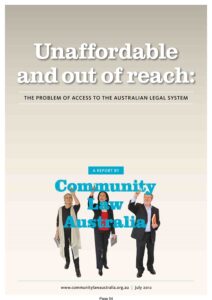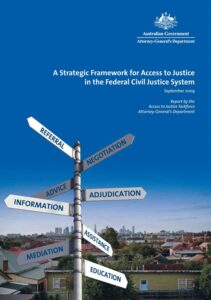All Bank Warriors and bank victims generally have experienced the lack of ‘Equality of Arms’ between them and the banks. The Federal Attorney General states clearly and unambiguously:
“…What constitutes a fair hearing will require recognition of the interests of the accused, the victim and the community (in a criminal trial) and of all parties (in a civil proceeding). In any event, the procedures followed in a hearing should respect the principle of ‘equality of arms’, which requires that all parties to a proceeding must have a reasonable opportunity of presenting their case under conditions that do not disadvantage them as against other parties to the proceedings. The UN Human Rights Committee has found a violation of article 14(1) in a case in which a right of appeal was open to the prosecution but not to the accused…”
The Federal Attorney General produced ‘A STRATEGIC FRAMEWORK FOR ACCESS TO JUSTICE IN THE FEDERAL CIVIL JUSTICE SYSTEM’ that defines the problem, back in the Rudd days
Community Law Australia in 2012 produced a final report titled ‘Unaffordable and Out of Reach’ that again clearly and unambiguously described the issue.
But nothing has changed.
Well that isn’t altogether true, the Federal Government did established the ‘Australian Financial Complaints Authority’ (AFCA) via notifiable instrument. This private limited liability company acts as gatekeeper for their ‘Financial Service Provider’ members and does so with impunity because there is no meaningful merits review of AFCA determinations outside the courts.
The Treasury on behalf of the Minister for Financial Services’ stated, “…the Government does not have the ability to review or overturn the decisions of AFCA or to direct AFCA on its handling of specific complaints…”. They create a self serving not fit for purpose monster that they cant even control.
‘Bank Warriors’ in conjunction with ‘Bank Reform Now’ have prosecuted a solution that does not place any significant burden on the public purse and will give all Financial Consumers ‘Equality of Arms’ with ‘Financial Service Providers’. That solution is the ‘Financial Services Law Force’ described below.
Below are articles and publications that illustrate the issue all Australians that interact with the Financial and Legal systems face. Because many of the articles are detailed, complex and long, we have engaged AI to produce an explanatory podcast for each.

By Michael Sanderson
Cast your mind back to the start of 2019, Hayne had just released the bank requested Clayton’s Banking Royal Commission, Final Report. FOS had been taken over by a company limited by guarantee called the Australian Financial Complaints Authority (AFCA). AFCA’s membership was 100% Financial Service Providers, with a voting structure that favoured those with the biggest fees, effectively putting the criminals in charge of the court.
An election was just around the corner, Labor was pumped, the polls said it was Shorten’s election to lose. There were all sorts of policies being bandied around, but there is one I want you to focus on; LABOR PLEDGES FREE LEGAL ADVICE FOR SMALL BUSINESSES AND FARMERS BATTLING BANKS, yes it was all in capitals.
There were three fundamental flaws in this policy that I will detail later, but this policy was the first time that I can find that a major party committed to address the fundamental lack of ‘Equality of Arms’ that small businesses, farmers, indeed the vast majority of Financial Service Provider (FSP) consumers face when a bank takes legal action.
Although flawed; Labor’s Promise to SME’s and Farmers was the first time that a major party committed to start building a fence at the top of the cliff. All we have had, up till now, is a hearse at the bottom of the cliff, that carted selected corpses off to the coroner’s ASIC and APRA for post-mortem. Even then they only retrieve some of the bodies, most who fell, or were herded by AFCA, or were pushed by a Bank, ended up in a mass grave and forgotten. On the rare occasion when a consumer did survive the fall, mortally injured they are generally ignored, or worse placated. Damaged, broke and disillusioned, they wander in a form of limbo, in search of some form of justice or even a friendly audience.
The Financial industry-controlled AFCA has proved over the past three years to be a disappointment, for consumers that is. In March this year the NSW Supreme Court overturns an AFCA ruling due to “absence of impartiality and independence”. If more could afford to take AFCA to court, it is believed, such judgements would be common place. The ‘Treasury Laws Amendment (Putting Consumers First—Establishment of the Australian Financial Complaints Authority) Bill 2017’ is a title that misrepresents what AFCA is, and ironically it was enacted by an ex-NAB banker.
The Federal Government, both franchises, are aware of the lack of ‘Access to Justice’ within the monetarised, ‘not fit for purpose’ legal sector. The Legal and Constitutional Affairs References Committee has considered the issue of Access to justice on at least three occasions this millennium:
• June 2004 – Inquiry into Legal Aid and Access to Justice
• December 2009 – Access to Justice
• April 2019 – Resolution of disputes with financial service providers within the justice system
The Committee in its 2009 ‘Access to Justice’ enquiry report, prophetically stated:
“…At present, reforming the legal system might appear difficult, onerous and expensive, but the committee believes that, ultimately, the investment of effort, time and money will result in significant benefits to all concerned. Otherwise, the committee predicts that within a decade it will again be inquiring into a failing, or failed, legal system and asking, ‘why wasn’t something done about this ten years ago…”
Guess what, ten years later in 2019, that same committee was enquiring into the ‘Resolution of disputes with financial service providers within the justice system’. Another four years have now past and there has been no improvement, indeed it could be reasonably argued that things are worse.
Now about the flaws of Labor’s policies.
The first flaw in the Labor policy is that funding was not linked to the action. Sure, Labor committed to fund community legal aid millions of dollars, but this was pocket change to Big Banks that had billion-dollar profits. In addition to their standard modus operandi of deceive, delay and deny, they have the financial capacity to match and raise.
The second flaw was that any expertise and intelligence developed, would be fragmented via an underfunded and overworked network of Community Legal Aid centres.
The third flaw is management and control, there was none. There was nothing to stop white anting, FSP influence or coercive control.
How does the Labor Federal Government fix the problem?
There is little point highlighting the problem ‘again’ and asking the Federal Government to fix it. That has been done in the past, there have been numerous enquiries and hundreds of submissions, and the issue acknowledged; nothing has changed. Be under no illusion that this is a Federal issue, not a State one, we are dealing with nationwide Banks, nationwide legal firms, that share resources and strategy. The solution must be nationwide with equivalent expertise, strategy and resources.
Now that Labor is in power, every Labor Member and Senator has been written to individually and personally, highlighting the ongoing festering issue of ‘Access to Justice’, and demanding, as well as prescribing a Federal ‘Financial Services Law Force’ (FSLF).
To put it another way, Labor is being asked to honour past promises with a couple of tweaks that reduces the cost to the public purse, retains and builds knowledge and expertise, firewalls the FSLF from white ants and most importantly, enables timely, equitable and proportional legal representation for all FSP consumers faced with legal action from a Bank. A FSLF will also support and fund the community legal aid network in proportion to the action.
All we are asking is that the new Federal Labor Government build the promised ‘fence at the top of the cliff’.

To long to read? This is an AI generated podcast that summarises this document.
“…The high price of legal services means that many Australians would find it difficult to pay for a lawyer for anything but the most basic legal issues. When people who can’t afford a lawyer turn to government funded legal assistance services, they find that due to chronic funding shortages, ongoing help is often restricted to those on the lowest incomes, and then only for a limited range of mainly family law and criminal law issues. Unlike the health and education system in Australia, there is no universal safety net for legal help…”

To long to read? This is an AI generated podcast summary of this document.
“..Access to justice is central to the rule of law and integral to the enjoyment of basic human rights. It is an essential precondition to social inclusion and a critical element of a well-functioning democracy…An effective justice system must be accessible in all its parts. Without this, the system risks losing its relevance to, and the respect of, the community it serves. Accessibility is about more than ease of access to sandstone buildings or getting legal advice. It involves an appreciation and understanding of the needs of those who require the assistance of the legal system…”

This is an AI generated podcast that summarises the issues that the letter below is in response to. It shows categorically that AFCA at best is not fit for purpose, more likely corrupt.
Thank you for your correspondence of 5 April 2023 to the Assistant Treasurer and Minister for Financial Services, concerning your dispute with the Bank of Queensland (BoQ) and the handling of that dispute by the Australian and Financial Complaints Authority (AFCA). The Assistant Treasurer has asked me to respond to you on his behalf.
I am sorry to hear about the difficulties you have been facing in relation to this matter.
I note that you have previously raised concerns about AFCA’s handling of your dispute previously, including in a detailed submission to the 2021 Review of AFCA undertaken by the Treasury and through the media.
As previously advised, the Government does not have the ability to review or overturn the decisions of AFCA or to direct AFCA on its handling of specific complaints.
Given the determinations made by AFCA are binding on the BoQ but are not binding on you, you have the right to pursue your dispute through a court. If you do not have the financial means to do so, you may wish to consider whether you could obtain assistance through the NSW Legal Aid, which is supported in part with funding provided by the Australian Government. NSW Legal Aid can be contacted by telephone on 1300 888 529 or via its website at www.legalaid.nsw.gov.au.
Link to Treasury letter below: